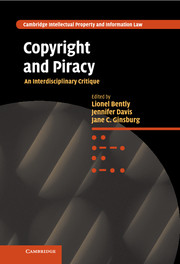Book contents
- Frontmatter
- Contents
- Notes on the contributors
- Editors' preface
- Table of cases
- Table of statutes
- Part I Introduction
- Part II History
- Part III Comparative Law
- Part IV Economics
- Part V Linguistics
- Part VI Computer software
- Part VII Information studies
- Part VIII Literature
- Part IX Art
- Part X Sociology/music
- 18 Reggae open source: how the absence of copyright enabled the emergence of popular music in Jamaica
- 19 ‘Free-riding on the riddim’? Open source, copyright law and reggae music in Jamaica
- Part XI Criminology
- Bibliography
- Index
19 - ‘Free-riding on the riddim’? Open source, copyright law and reggae music in Jamaica
from Part X - Sociology/music
Published online by Cambridge University Press: 17 November 2010
- Frontmatter
- Contents
- Notes on the contributors
- Editors' preface
- Table of cases
- Table of statutes
- Part I Introduction
- Part II History
- Part III Comparative Law
- Part IV Economics
- Part V Linguistics
- Part VI Computer software
- Part VII Information studies
- Part VIII Literature
- Part IX Art
- Part X Sociology/music
- 18 Reggae open source: how the absence of copyright enabled the emergence of popular music in Jamaica
- 19 ‘Free-riding on the riddim’? Open source, copyright law and reggae music in Jamaica
- Part XI Criminology
- Bibliography
- Index
Summary
Jason Toynbee asserts that reggae music would never have emerged had ‘copyright proper’ been enforced in relation to the commercial exploitation of music in Jamaica.
Our starting point is the Imperial Copyright Act of 1911 (‘the 1911 Act’) which applied to colonies of the UK and was adopted in Jamaica in 1913. A brief background to the 1911 Act in relation to the exploitation of music in the UK will serve to put that Act in context.
In the UK, in the nineteenth and early twentieth centuries, music publishing was an industry of small family businesses whose revenue centred on the sale of sheet music. Sheet music and live performances were the predominant mode of dissemination of music. At this time, music publishers ‘showed little enthusiasm for the bothersome, costly, unfamiliar, and unpopular business of collecting fees for performances’. In the late nineteenth century, the recording industry was in its infancy and its business was based upon the mechanical reproduction of music. Music publishers challenged this practice in a test case, and Stirling J. held that the unauthorised reproduction of musical works by mechanical instruments was not an infringement of copyright. The subsequent boom in the recording industry, combined with sheet music piracy, left music publishers experiencing a serious downturn in sales of sheet music, which music publishers sought to redress by collecting fees for public performance of music which led to the establishment in 1914 of the Performing Right Society (PRS).
- Type
- Chapter
- Information
- Copyright and PiracyAn Interdisciplinary Critique, pp. 374 - 386Publisher: Cambridge University PressPrint publication year: 2010
- 2
- Cited by

